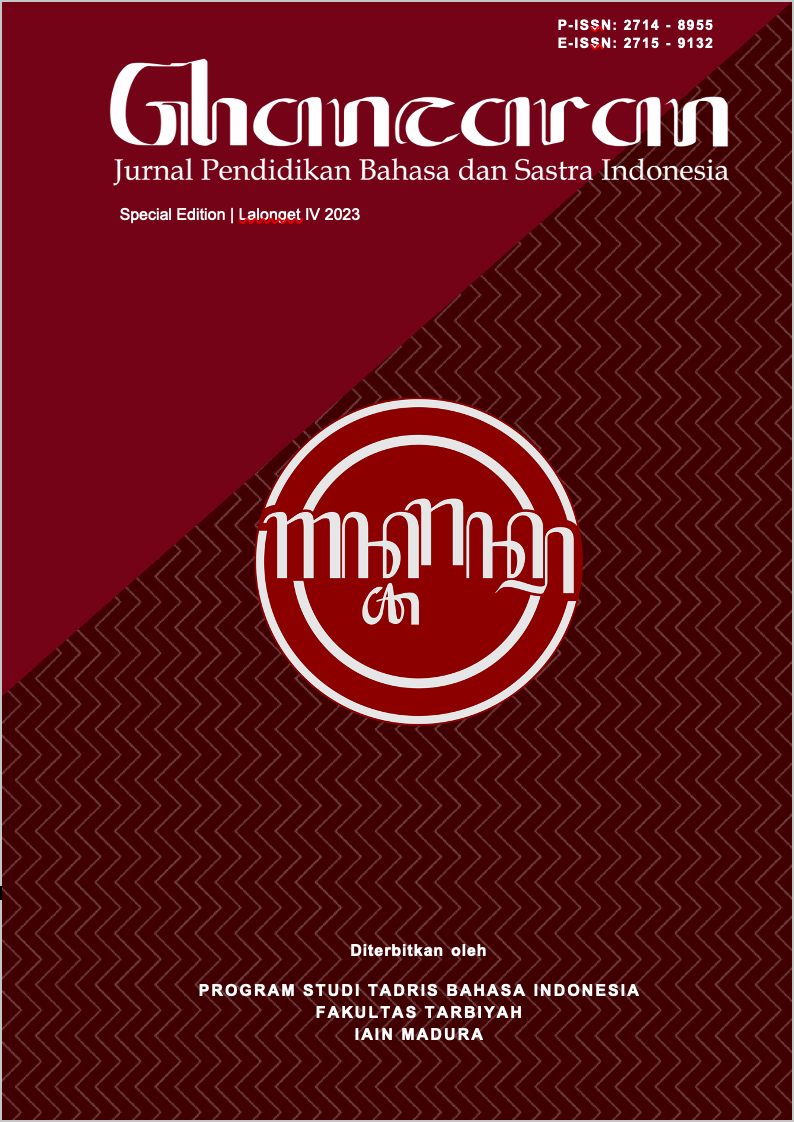Aplikasi Orai: Pemanfaatan Media Pembelajaran Alternatif Guna Melatih Kelancaran dan Kepercayaan Diri Public speaking Mahasiswa
 Abstract views: 427
,
Abstract views: 427
,
 PDF downloads: 361
PDF downloads: 361
Abstract
This research is motivated by the importance of public speaking for students, but the lack of fluency in public speaking for students. This is something that needs a solution. The aim of this research is to describe the use of the Orai application as an alternative learning media to train students’ public speaking fluency and confidence. This research uses descriptive qualitative methods. Data collection techniques in this research are observation, interviews and documentation. The results of this research are in the form of using the Orai application as an alternative learning media to train students’ public speaking fluency and confidence in several stages. These stages include; downloading, using and describing the application.
Downloads
References
Batubara, H. H. (2019). Penggunaan Google Form sebagai Alat Penilaian Kinerja Dosen di Prodi PGMI Uniska Muhammad Arsyad Al Banjari. 1(http:// ejournal.unsub.ac.id/ index.php/ sendinusa/ issue/ view/ 61).
Guntur, M., dkk. (2023) Pengembangan Bahasa pada Anak Usia Dini. Yogyakarta: Selat Media Patner.
Harahap, O. F. M., dkk. (2022). Teori dan Perspektif Penggunaan Media Pembelajaran dalam Pembelajaran Bahasa Inggris. CV. Azka Pustaka.
Kremer, H. (2022). Termodinamika Komunikasi. Sukoharjo: Pradina Pustaka.
Kustandi, C., & Darmawan, A. (2020). Pengembangan Media Pembelajaran, Konsep & Aplikasi Pengembangan Media Pembelajaran Bagi Pendidik di Sekolah dan Masyarakat. Jakarta: Kencana.
Markhamah, dkk. (2022) Kajian Bahasa: Perspektif Multidisiplin. Surakarta: Muhammadiyah University Press.
Mu’in, F., Noortyani, R., Wiranda, N., dan Anisa, Y. H. (2022). Pelatihan Aplikasi Orai untuk Menunjang Pembelajaran Public speaking Secara Mandiri bagi Pemuda Karang Taruna. Jurnal Pengabdian Masyarakat. Volume 4 (Nomor 3) halaman 944-952.
Pribadi, B. A. (2017). Media dan Teknologi dalam Pembelajaran. Jakarta: Kencana.
Moleong, Lexy J. M. A. (2018). Metodologi Penelitian Kualitatif (Edisi revi). Bandung: PT Remaja Rosdakarya.
Rachmayanti, I., & Alatas, M. A. (2021). Pemanfaatan Aplikasi Whatsapp Group Sebagai Media Pembelajaran Daring pada Masa Pandemi Covid-19. Jurnal Bio Educatio, 6(4), 68-81. Retrieved from
Umrati, & Wijaya, H. (2020). Analisis Data Kualitatif Teori Konsep dalam Penelitian Pendidikan. Makassar: Sekolah Tinggi Theologia Jaffray.
Safira, A. R. (2020). Media Pembelajaran Anak Usia Dini. Gresik: Caremedia Communication
Siregar, N. S. S., Tamsil, I. S. (2022). Buku Ajar Public Speaking. Surabaya: Scopindo Media Pustaka.
Sugiyono. (2014). Metode Penelitian kuantitatif, kualitatif dan R & D. Bandung: Alfabeta.
Suryadi, A. (2020). Teknologi dan Media Pembelajaran Jilid I. Sukabumi: CV Jejak.
Tumbel, F. M., & Kawuwung. F. R. (2023). Buku Ajar Media Pembelajaran. Yogyakarta: Selat Media Patner.
Yahya, I. (2022). Bahasa Indonesia untuk Perguruan Tinggi. Yogyakarta: PT. Nas Media Indonesia.
Copyright (c) 2023 GHANCARAN: Jurnal Pendidikan Bahasa dan Sastra Indonesia

This work is licensed under a Creative Commons Attribution-ShareAlike 4.0 International License.
Ghancaran: Jurnal Pendidikan Bahasa dan Sastra Indonesia uses an Open Access Policy under the Creative Commons Attribution-ShareAlike 4.0 International License. Authors publishing in this journal agree to the following terms:
- Ghancaran Journal holds the copyright and grants the journal rights for first publication with the work simultaneously licensed under a

The work is distributed under Creative Commons Attribution-ShareAlike 4.0 International License which allows others to share, copy, and redistribute the material in any media or format and adapt, remix, change, and develop the material even for commercial purposes, as long as it is stated credit and license derivative works under similar terms. - Authors may make additional contractual arrangements for non-exclusive distribution of the journal's published work version.
- Authors are permitted to post their work online (e.g., in institutional repositories or on their websites) before and during submission, as doing so may lead to productive exchange.



















